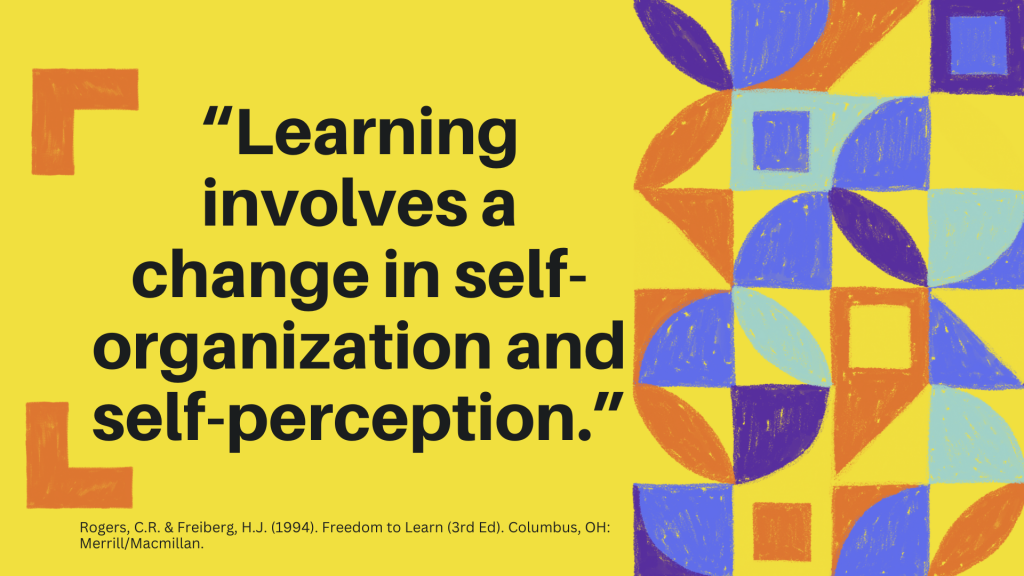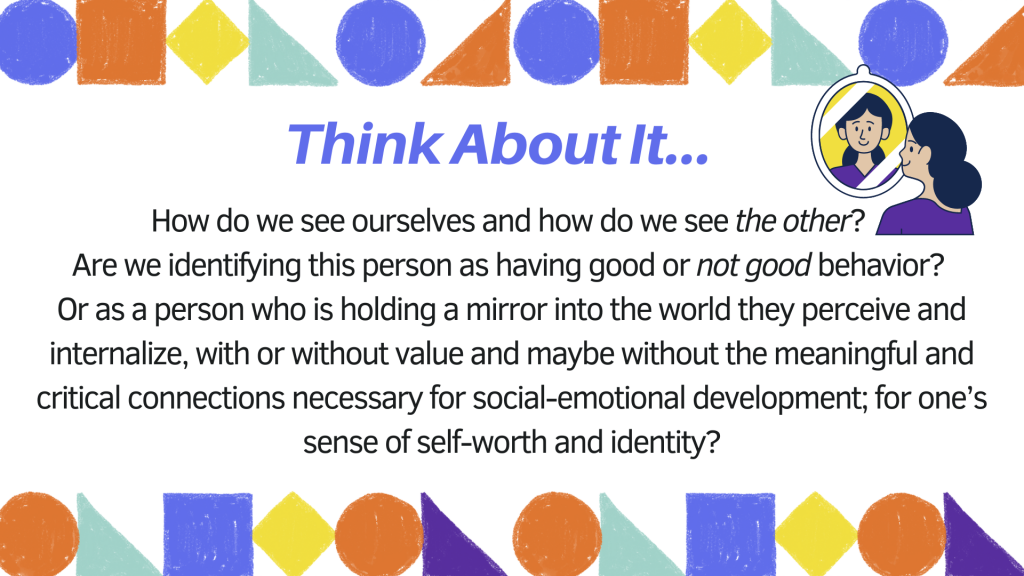AN INTRODUCTION TO THE RELATIONSHIP-BUILDING FRAMEWORK OF GENTLE TEACHING
Contributed by Anthony M. McCrovitz, Ph.D., LMHC, HSPP, BCPC, IMH-E® (II), DAPA [June 1, 2021]
Gentle Teaching recognizes the intrinsic relationship needs of human existence. A Gentle Teaching Framework establishes a learning environment for teaching four pillars that mentor social-emotional awareness and growth, validating the foundational human need for connection (companionship) and the longing for unconditional belonging (a sense of community).
With Gentle Teaching, human connections are made by using ‘OUR TOOLS” (hands, eyes, words, presence) that create the invitation to experience belonging and engagement with others; to learn about companionship and community.
The philosophy and principles of Gentle Teaching are rooted in a psychology of interdependence, a word from the Latin root inter, meaning ‘among’ or ‘between.’ The main idea about interdependence recognizes the web of human existence as an inseparable, social fabric through which unifying connections and forms emerge through the affirming and cultivating of relationships.
Coherent modeling and experiencing of these relational connections cultivate the foundational processes of social- emotional development.
Self-perception and growth in awareness in-forms the groundwork and development of value and meaning for one’s identity and feelings of self-worth. Each one’s capacity for relationship-building stems from this self- formed and self-perceived valuing that, ideally, flowers forth with imagination, reciprocation, and engagement, reflecting one’s self-constructed picture of value and meaningful quality-of-life outcomes, regardless of ability.
A framework of Gentle Teaching views quality of life in proportion to eight, foundational human values that are universally recognized and considered essential for meaningful human existence. With mutual respect, a framework of Gentle Teaching constructs dialogue (verbal and non-verbal) for engaging social-emotional awareness in a learning environment. This environment is a culture of gentleness that unconditionally values and acknowledges others. The creating of meaningful moments (CMM) support interactions between a mentor and Individual or group, engaging collaborative, relationship-building learning processes.
The role of “mentor” can be a teacher, caregiver, facilitator, therapist, parent, friend, etc., who uses “Our Tools” (hands, eyes, words, presence) for teaching the Four Pillars of Gentle Teaching: (1) how to feel safe; (2) how to feel loved; (3) how to feel and be loving; (4) how to be and become engaged (reciprocation).
These four pillars uphold the foundation of awareness and growth, guiding the interactions that teach one with elements of companionship and elements of reciprocation for engagement with community. The four pillars are interdependently whole for coherent and lifelong learning. One learns how to trust and how to feel and know they are safe and loved. When feeling safe and loved is meaningfully integrated and developed with quality-of-life-values, new moral memory becomes rooted in one’s experience, cultivating the core capacity for one’s social- emotional awareness and growth.
New moral memory can develop when a new pattern is learned for the social-emotional processing of information. Much like practice of a new skill, the repetition of the new pattern is what allows for its integration.
Especially in working with trauma-informed expressions, a shift in awareness evolves as new moral memory is being created and becoming rooted in the “feeling/sense” foundation of self-concepts. Gentle Teaching opens up relationship-building potential, the invitational space ‘between’ all interconnecting points, where the mirroring of meaning and value exists for human connection; for creating new moral memory; for returning to the interdependent roots of our relational existence.
Accessibility to relationally-dynamic learning environments is critical for this development and growth, providing mentoring dialogue (verbal and non-verbal) and opportunities for meaningful, social-emotional interactions. While this naturally occurs in family and other social structures, this accessibility is often out of reach for marginalized and/or traumatized individuals.
Self-reflection and thoughtful planning is important to the mentoring role and practice of Gentle Teaching. The ‘lead’ is with the learner and their perspective; the ‘direction’ is with the framework of Gentle Teaching.
A framework of Gentle Teaching creates a dynamic learning environment, identifying possibilities for relationship-building, developing companionship and a sense of community with others; teaching that one is not isolated or separated, but included and connected within the social fabric.
Processes of learning/mentoring build from this foundation that forms the intrinsic knowing/sense of self and authentic identity, aligning perception and interaction with value and meaning that relates to the life of the Individual, as well as to the life of the community.
A framework of Gentle Teaching invites professional engagement and asks: how do we see ourselves and how do we see the other? Are we identifying this person as having good or not good behavior? Or as a person who is holding a mirror into the world they perceive and internalize, with or without value and maybe without the meaningful and critical connections necessary for social-emotional development; for one’s sense of self-worth and identity?
For the mentoring journey, a framework of Gentle Teaching establishes a platform for dialogue that speaks to social-emotional awareness and growth, creating social fabric within a relational, interdependent context of value and meaning, cultivating companionship and the formation of community. The relationship-building journey is our privilege and opportunity to behold who we are and who the other is; to plan and set the foundation for a mutually beneficial relationship-building teaching/ learning environment; to perceive the path between us as one of possibilities and potential outcomes for quality of life. How can I invite trust and create a connection? How can I identify and discover, with this person, what is unknown and unseen about their quality of life? (Relating to eight, quality-of-life values.)
A practice of unconditional love and acceptance lays a foundation of value and meaning for the mentoring journey, whether the time together is a spontaneous moment, a scheduled hour, or a lifetime commitment. Gentle Teaching brings light into the shadows of separateness and brokenness that marginalize and distance human beings from one another. In the shifting of our perception, we change our view toward how we see ourselves in relation to others.
“Learning involves a change in self-organization and self-perception.”-Carl Rogers
In the same regard, teaching involves self-reflecting on the views and values that form our perception and frame the learning landscape.
As one can experience and awaken to unconditional acceptance of who (s)he is with mutual support/solidarity, awareness can shift and connect in the varied ways it seeks to find a valued and meaningful experience of existence, and then an expanded sense of self that exists as an interdependent unity—in community with others. As self-concepts evolve through companionship and community, genuine forms of expression become reciprocated (self-determination).
Unconditional love means unconditional acceptance. This is key to the understanding of our role in facilitating quality of life outcomes with a Gentle Teaching framework. As we teach, we learn; as we learn, we teach.

